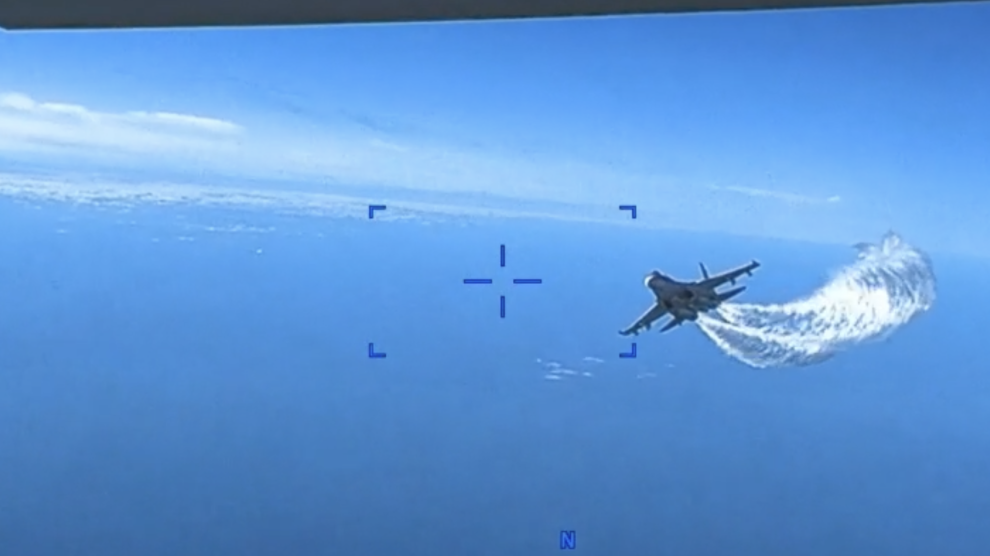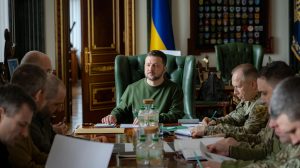You can read all of our coverage of Russia’s invasion of Ukraine, including explainers and articles offering context and background information here.
Russia’s invasion of Ukraine
US European Command issued a video on Thursday which it says shows the moment of impact when a Russian fighter jet struck the propellor of a US MQ-9 Reaper drone over the Black Sea, causing the latter to be ditched into the water. The incident happened on Tuesday morning and the confrontation lasted around 30-40 minutes.
The footage shows aircraft making two extremely close passes to the drone, before the image breaks up. The video was released with the following caption:
Two Russian Su-27 aircraft conducted an unsafe and unprofessional intercept with a US air force intelligence, surveillance, and reconnaissance unmanned MQ-9 aircraft operating within international airspace over the Black Sea on 14 March 2023. Russian Su-27s dumped fuel upon and struck the propeller of the MQ-9, causing US forces to have to bring the MQ-9 down in international waters.
Russia’s defence ministry had claimed earlier in the week that its fighters “did not use airborne weapons and did not come into contact” with the US drone.
Poland’s president says his country plans to give Ukraine a dozen MiG-29 fighter jets, becoming the first NATO member country to fulfill the Ukrainian government’s increasingly urgent requests for warplanes.
President Andrzej Duda said Thursday that Poland would hand over four of the Soviet-made warplanes in the coming days and the rest need to be checked and would be supplied later.
Duda did not say if other countries would be making the same move, although Slovakia has said it would send its disused MiGs to Ukraine.
Ukrainian President Volodymyr Zelensky on Thursday vowed to hold Russia accountable for the bombing last year of a theatre in the southeastern city of Mariupol that killed hundreds of people.
“A year ago, Russia deliberately and brutally dropped a powerful bomb on the Drama Theatre in Mariupol downtown. Next to the building was the inscription ‘Children,’ which was impossible to overlook. Hundreds of people were hiding from the shelling there,” Zelensky said on the anniversary of the attack.
The bombing of the theater, where Ukrainian officials say up to 1,300 people had sought refuge, was among the most brazen of Russia’s attacks on civilians since its invasion began in late February last year.
Painted on the ground outside the building — in giant Russian letters — was the word “CHILDREN”. The message — large enough to be viewed from the sky — was scrawled near a public square.
Ukraine won a significant boost in its attempt to set aside a three billion US dollars defaulted bond after the UK Supreme Court ruled that judges need to consider the backdrop of Russia’s campaign of threatening behaviour in the run-up to the annexation of Crimea.
Britain’s top court declared that a judge should pore over Russian attempts to strong-arm Ukraine into buying the bond, giving the green light to a full-blown London trial. The long-awaited decision allows Ukraine to argue that the bond, sold in 2013 on the eve of the revolution in Kyiv, was part of unlawful political and military aggression from Moscow.
“The success of Ukraine’s defence turns on whether it can establish that Russia threatened the use of force and that those threats were a reason for Ukraine’s decision to enter into the agreement,” Judge Robert Reed said in the ruling. “That question can only be determined after trial.”
Russia’s invasion of Ukraine has not only caused heavy devastation of infrastructure and production capacities but has also led to unprecedented losses of Ukrainian human capital, a note published this week by the EBRD shows.
Many people have had to leave their jobs and homes since the war began, the note says, resulting in a ‘brain drain’, disruption to education and skills-matching, and the suspension or destruction of vital services and infrastructure that enable people to work and build up their human capital.
Early evidence and estimates of the scale of migration and labour force displacement suggest that 35 per cent of Ukraine’s pre-war population are now living away from home. Of a 2021 population of 41.4 million, an estimated 7.8 million have left Ukraine and another 6.5 million are internally displaced. Almost one in four of the pre-war female population is now abroad, most of whom were employed before leaving the country, versus 13 per cent of males. Most refugees have not found work in the host countries and many face financial difficulties.
Many others have also lost their lives or sustained injuries that prevent them from working.

Other news
Stefan Wilmont, who killed Gdańsk mayor Paweł Adamowicz on stage at a charity event in January 2019, was this week found guilty of murder and given a life sentence. The ruling, which can be appealed, comes after a long legal process in which prosecutors sought to assess Wilmont’s mental fitness to stand trial. His defence team later pleaded for proceedings to be discontinued on grounds of their client’s insanity. Adamowicz was fatally stabbed by Wilmont on January 13, 2019, during a concert organised as part of the Great Orchestra of Christmas Charity (WOŚP), Poland’s largest annual charity event.
Serbian President Aleksandar Vučić this week said there will be “neither the factual nor de jure” recognition of neighboring Kosovo under his leadership, vowing that he “won’t be the one to sign” onto the independence of the majority-ethnic Albanian former province. The statements appear to dash diplomatic momentum after Vučić and the Kosovar prime minister, Albin Kurti, pledged their willingness in Brussels on February 27 to continue the implementation of a normalisation road map known as the Franco-German plan.
Hungarian oil company MOL plans to sell 39 service stations in Slovenia to Shell to receive EU Commission clearance for the takeover of the Slovenian branch of Austrian oil company OMV, the country’s second-largest chain of service stations. The transaction involves some existing service stations from MOL and OMV, the Hungarian company said Tuesday. MOL signed a contract worth 301 million euros to increase its share in OMV Slovenija by 92.25 per cent in 2021.
Moldova is no longer receiving Russian gas or enduring the “blackmail” imposed by gas giant Gazprom over its difficulties in paying for supplies, the country’s energy minister said this week. Victor Parlicov, speaking to TV8 television on Wednesday evening, said Gazprom had been providing supplies only to Moldova’s Russian-backed Transnistria separatist region since December, with none going to central authorities in Chișinău. He said Moldova was able to secure European supplies thanks to 300 million euros in credits from the EBRD.
A group of more than 100 EU lawmakers is urging European soccer’s governing body to ban Belarus from qualifying for the 2024 European Championship. MEPs from across the political spectrum wrote in a letter sent to UEFA president Alexander Ceferin that the Belarusian national team should not be able to compete because of the country’s terrible human rights record. “These are not only UEFA values at stake, but also UEFA´s reputation and image within democratic societies and international community,” they said.
An activist with the Polish women’s rights group Aborcyjny Dream Team (Abortion Dream Team) was this week found guilty of helping a local woman receive an illegal medication abortion, which is a crime carrying a prison sentence of up to three years under the Polish penal code. At the prosecutor’s request, the 47-year-old Justyna Wydrzynska was sentenced to eight months of community service. She was cleared of an additional charge, that of possessing medicines with intent to market them.
One of the last wild rivers in Europe has been declared a national park by the Albanian government, making it the first of its kind on the continent. The Vjosa River flows 270 kilometres from the Pindus mountains in Greece through narrow canyons, plains and forests in Albania to the Adriatic coast. Free from dams or other artificial barriers, it is rich in aquatic species and supports myriad wildlife, including otters, the endangered Egyptian vulture and the critically endangered Balkan lynx, of which only 15 are estimated to remain in Albania.
Andrew Tate’s appeal against a 30-day extension of his detention in Romania has been denied by a court, meaning the controversial social media influencer will remain in prison. Tate, a British-US citizen, was appealing in Bucharest against a judge’s decision on 21 February to keep him in a Romanian prison for a further 30 days. The rejection of his appeal means he will remain in detention until at least March 29. It is the fourth time Tate has had a request to be released from custody rejected since his arrest in December last year.
A Russian stand-up artist known for his often-political act has complained that his set to a crowded theatre in Uzbekistan’s capital was censored whenever the subject turned to President Vladimir Putin and other touchy political issues. Danila Poperechny, who styles himself as Russia’s answer to U.S. comic Louis C.K., wrote in an Instragram post on March 14 that his microphone was turned off during sensitive sections of his act “upon the instruction of local law enforcement.” “Literally every single time a joke or the subject in some way had anything to do with current affairs, they just cut off the microphone in the middle of the act,” he wrote.
Photo: US European Command.
Unlike many news and information platforms, Emerging Europe is free to read, and always will be. There is no paywall here. We are independent, not affiliated with nor representing any political party or business organisation. We want the very best for emerging Europe, nothing more, nothing less. Your support will help us continue to spread the word about this amazing region.
You can contribute here. Thank you.







Add Comment